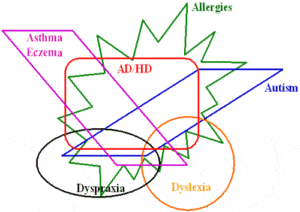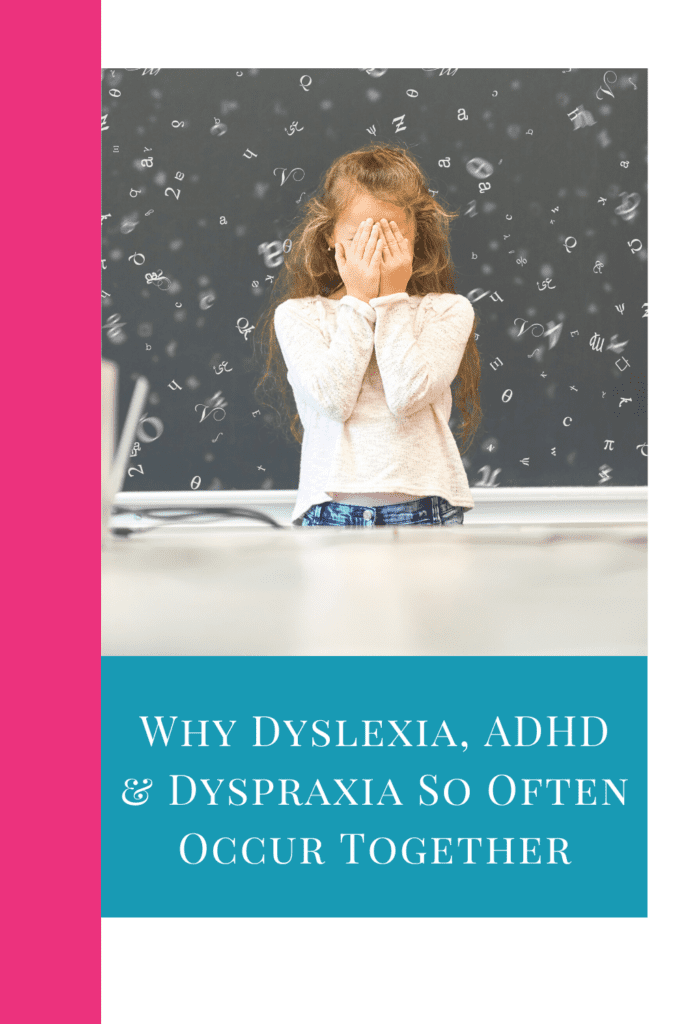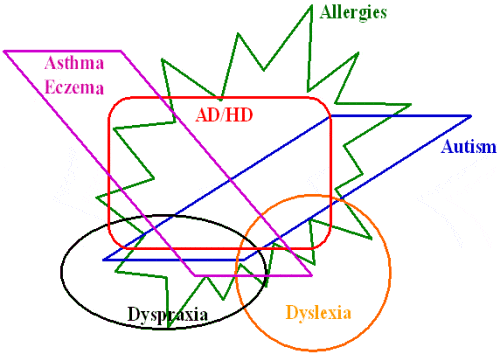If I had a dollar for every child I work with who has more than one diagnoses, I would be rich. Rarely do I see a child who just has dyslexia with no other diagnoses or difficulties. Parents almost always come to see me because of one major concern. Usually that concern is either reading or behaviour.
Yet as I do the intake and the screening, it turns out their child has any number of diagnoses – ADHD, ODD, dyspraxia, dysgraphia, SPD, OCD and ASD.
…and let’s not forget the eczema, psoriasis, asthma, environmental and food allergies, ear infections, sore tummies and digestive troubles that are so common with these diagnoses.
Multiple Diagnoses are Just Proof that Something is Way Off – And It Can Be Changed!
The more diagnoses that a child has, the more discouraged a mom feels that her child has been hit by lightening multiple times. Mom doesn’t even know where to start. The most common overlapping diagnoses that I see are dyslexia with ADHD and/or dyspraxia.
While multiple diagnoses and overlap can feel daunting, moms think I am crazy when I say that I see this as reassuring.
Yes – reassuring.
Multiple diagnoses is just more ‘proof in the pudding’ that something is seriously off, that there are definitely some ‘glitches’ in your child’s brain development and brain organization and that there is very likely some gut-brain issues triggered by an overgrowth of bad bacteria and nutrient deficiencies. The good news is that all of this can be changed.
Multiple Diagnoses is the Rule – Not the Exception
I’m not going to lie, even if I do risk sounding completely mad. My favourite clients are the ones with the multiple diagnoses – the kids who are struggling so much that the parents are pulling their hair out. Because that’s where both myself and the parents always see the most amazing results and usually in a short amount of time.
When it comes to children’s neuro-developmental disorders, like dyslexia, multiple diagnoses are in fact the rule – not the exception. Researchers have actually studied the phenomena of co-morbid symptoms (meaning multiple diagnoses) because it is so common.
…Just one more reason you shouldn’t feel like you and your family has been cursed, or that you have something to feel guilty about as a mom.
You’re not cursed and neither is your child.
A Disorganized, Disconnected Brain Can Become Organized
The fact that 53% percent of children with dyslexia have ADHD and 85% have dyspraxia and 17% have ODD is only further proof that these childhood disorders are not some mysterious-how-did-this-happen disorder. It’s proof that there is a lot more going on that we CAN address and overcome and that it’s not some mythical, irreversible demonic gene that is causing dyslexia, ADHD or any other disorder.
…definitely genetics can play a role, but it’s only a part of the puzzle and certainly not the end of the story.
The difficulty reading, poor focus, clumsiness, the attitude and hypersensitivity to noise or texture, the illegible handwriting, picky eating and forgetfulness – in whatever combination or package they come for your child – are all indications that your child has a brain that is struggling.
The reason there is overlap is because there are weak connections in certain areas that affect multiple skills and areas of disconnection and imbalance.
…and it’s not your fault. I’m not here to say you did anything wrong.
Really It’s Not You – It’s Us – We’ve Changed
We as a society and even as a species have advanced and changed so much that we have altered the very way that we were naturally designed to evolve and develop.
Our diet and lifestyle have changed exponentially in recent decades. They have changed more than any other time in our entire evolutionary history. From the way our children’s brains develop differently as infants, to our school system and the way we teach ‘literacy’, to the food we grow, manufacture and eat to environmental toxicity.
That’s a lot of change all at once and it only makes sense that it will cause some problems in our children.
A Case of the ‘Left Brain Doesn’t Know What the Right Brain is Doing’
So by now you want me to shut up and tell you already why exactly there is overlap and what is going on with your child’s brain.
There is overlap because all of these disorders are actually symptoms of a brain that has areas of underdevelopment, weak connections – ‘glitches’. What that means is that for various reasons your child is not using the best area of their brain to perform a task.
It’s like asking the doctor to do the secretary’s job. The doctor might be able to get by, but it won’t be optimal or great because that’s not the doctor’s job. But what do you want the doctor to do?
He has no choice if the secretary is either not that great at her job (think weak connections) or the secretary is out to lunch (not a whole lot of activity in that area of the brain at all). The doctor does some of her job while doing his and that is a lot of work and stress on him which will cause fatigue and overload. Talk about disorganization!
Is Your Child’s Brain Working Too Hard?
To put it in simpler terms, imagine you have broken your dominant hand and now you have to write with your non-dominant hand. You will manage but it will slow you down, it will be hard, requiring a lot more concentration and even despite all of that hard work – it won’t be your best handwriting. That is what is going on with your child’s brain.
Their brain is working way too hard to learn because they have areas that are weak or disconnected. This is not only going to impact the processes for reading, but overall learning and even behaviour.
How We Diagnose – The Symptoms Not The Cause
Currently diagnoses are created based on a cluster of symptoms like poor focus, poor auditory processing, weak phonemic awareness, weak executive functioning are then categorized into clusters and into specific labels in terms of what skills they affect and then we give it a name.
For example, put poor phonemic awareness with weak auditory processing and possible poor working memory and you have ‘dyslexia’. But when you have weak auditory processing and executive function then ADHD might be a factor.
The Disorders, Difficulties and Overlap are Real but WHY!?
I am in no way trying to minimize or belittle these diagnoses or pretend that they are not ‘real’ or that the science is all hogwash. They are very real disorders.
Yet we need to talk more about the decades of research that has found why there is so much overlap. Ultimately when there are ‘short-circuits’ in the brain, it’s much more likely that several skills or behaviours are going to be impacted.
The Gut & Psychology Syndrome
It was neuroscientist, Dr. Natasha Campbell-McBride who first addressed the overlap of various childhood disorders when she began noticing how many of her patients had overlapping neuro-developmental disorders. She quickly observed that almost all of these patients also happened to have immune and gut related issues. She became one the pioneers in addressing the connection between the gut and the brain.
A Cluster of Symptoms = The Same Source
 Dr. Campbell-McBride’s conclusion was that so many of her patients had overlapping disorders because the disorders were created based on a cluster of symptoms rather than the actual source of the problem.
Dr. Campbell-McBride’s conclusion was that so many of her patients had overlapping disorders because the disorders were created based on a cluster of symptoms rather than the actual source of the problem.
Brain health is crucial and we generally understand that to varying degrees. But brain organization impacts everything when it comes to learning and behaviour and yet it is rarely addressed in most educational and medical circles.
Poor Sensory-Motor Development
For many of my clients that have dyslexia combined with dyspraxia, ADHD, SPD or dysgraphia there is frequently poor sensory-motor development in the brain. This is the one of the first areas of the brain to develop but for various reasons there can be areas that are not fully developed, reflexes that are retained and this results in weak connections, imbalance between the two brain hemispheres and disorganization.
The Limitations of Psycho-Ed Evaluations
When we get a psycho-ed evaluation it will tell you things like your child has weak auditory processing or phonemic awareness or that your child has poor executive functioning – many of these processes affect multiple skills and abilities like focus, following instructions, memory and reading.
What the evaluation does not tell you is why – or even what you can do about improving those processes.
There are suggestions for modifications and accommodations on the IEP but what will extra test time give your child in terms of improvement? What will being seated away from distractions improve in the long run? Not much.
I hate to sound harsh but deep down you know it.
As one mom said, “there are no IEP’s in the workplace.”
I want to be clear that I think IEP’s can be immensely beneficial when used properly to help move a child towards achieving a goal and improvement but they often aren’t. They are used as band-aids or crutches or even reasons or excuses for the school system’s failure to teach a child to read and learn and to read and learn well.
If we focused on strengthening weak connections, creating better brain organization and the need for bio-individual nutrition then who knows how quickly multiple diagnoses might be overcome and IEP’s a temporary measure.
To learn more about an approach that combines nutritional therapy with cognitive exercises that re-organize the brain and strengthens weak connections check out my programs Reading Rockstar Bootcamp and The Full Potential Clinic.
Set up a free 20-minute discovery session to learn more about how you can help your child improve their reading comprehension so they can become a fluent reader and a more confident kid.
Sources:
Shaywitz, Sally, Overcoming Dyslexia
https://www.ncbi.nlm.nih.gov/pmc/articles/PMC4001144/
https://www.mdpi.com/journal/children/special_issues/Dyslexia
https://www.apraxia-kids.org/wp-content/uploads/2012/12/2002-AJR-Handout-FAs-in-DDA.pdf


